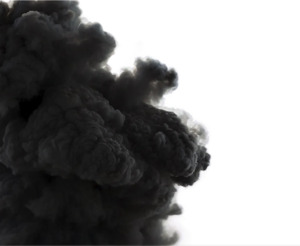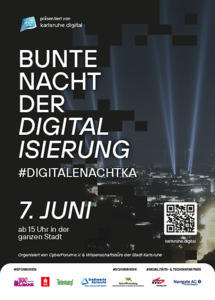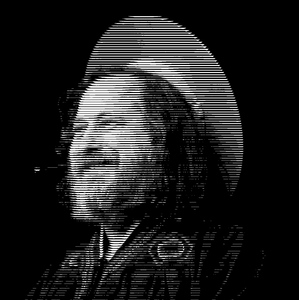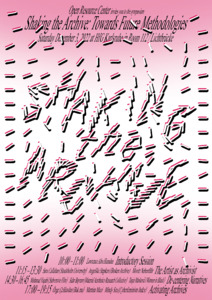Víctor Fancelli Capdevila
| Name | Víctor Fancelli Capdevila |
| Links | |
| Kurzbiographie | Víctor Fancelli Capdevila arbeitet als Digital Archivist. |
5 Inhalte
- Seite 1 von 1
After Memory
- Titel
- After Memory
- Titel (en)
- After Memory
- Untertitel
- Recalling and Foretelling across Time, Space and Networks
- Untertitel des Projekts/Werks (en)
- Recalling and Foretelling across Time, Space and Networks
- Autor/in
- Beschreibung (en)
- The project AFTER MEMORY begins with a symposium that brings together key figures from the fields of art, science, technology, museology, and activism. It aims to initiate an open process of experimentation and imagination and to form a sustainable network for exchanging and developing ideas in collaborative ways. The programme unfolds along three lines of enquiry that consider the spatial, temporal, and social dimensions of digital memory.
- Kategorie
- Typ des Projekts/Werks
- Schlagworte
- Datierung
- 23.10.2024 - 26.10.2024
- Mitwirkende
- Dank an
- Ort: Institution
- Stadt
- Land
- Beteiligte Institution(en)
- Internetlinks
- Titel
- After Memory
- Semester
- Importiert am
- 05.06.2024
- Übergeordnete Sets
- 0
- Set enthält
- 1 0
Bunte Nacht der Digitalisierung 2024
- Titel
- Bunte Nacht der Digitalisierung 2024
- Titel (en)
- Colourful Night of Digitalization 2024
- Beschreibung (de)
- Am 7. Juni findet die Bunte Nacht der Digitalisierung statt, ein Festival, das die Vielfalt der Perspektiven und Herausforderungen der Digitalisierung in Karlsruhe feiert. Diese Initiative öffnet den Karlsruher Bürgern die Türen von mehr als 60 Institutionen (Bibliotheken, Museen, Universitäten, Unternehmen, Bürgerinitiativen), um verschiedene Themen und Ansätze zur Digitalisierung zu zeigen und zu diskutieren.
- Beschreibung (en)
- On June 7th, the Colourful Night of Digitization, a festival to celebrate the diversity of perspectives and challenges on digitization that exists in Karlsruhe, will take place. This initiative opens the doors of more than 60 institutions (libraries, museums, universities, enterprises, civil initiatives) to the citizens of Karlsruhe to show and discuss diverse topics and approaches to digitality.
- Typ des Projekts/Werks
- Schlagworte
- Datierung
- 07.06.2024
- Mitwirkende
- Ort: Institution
- Ort
- Hochschule für Gestaltung: 112
Kronenplatz;
Werkstatt und Studio von Triangel
- Hochschule für Gestaltung: 112
- Stadt
- Land
- Beteiligte Institution(en)
- Internetlinks
- Titel
- Bunte Nacht der Digitalisierung 2024
- Importiert am
- 05.06.2024
- Übergeordnete Sets
- 0
- Set enthält
- 3 1
Who cares?
- Titel
- Who cares?
- Titel (en)
- Who Cares?
- Untertitel
- Digitale Sozialität, Infrastrukturen der Fürsorge und konviviale Technologien
- Untertitel des Projekts/Werks (en)
- Digital sociality, care infrastructure and convivial technology
- Autor/in
- Beschreibung (de)
- Die Hackerkultur verbindet Theorie und Praxis (nach hand-on Prinzipien) und einen neuen Ansatz für Kulturmaterialien ("information wants to be free"), der nicht nur eine andere Epistemologie, sondern auch einen neuen politischen Diskurs über Digitalität, Geräte und Menschen impliziert. Das Verhältnis zwischen Technik und Politik dieser Gruppe wird im ersten Kapitel analysiert: Zuerst wird die Entstehung proprietärer Software betrachtet, dann die Unterschiede zwischen Open Source und freier Software, und wie im letzten die Privateigentum und die soziale Beziehung zwischen Programmen, Benutzern und Entwicklern radikal in Frage gestellt werden. Später wird diese Beziehung anhand von Hanna Arendts 'Die conditio humana' in Bezug auf Arbeit, Herstellen und Handlen, Notwendigkeit und Freiheit, die die Bedingungen für Politik schaffen, weiter diskutiert. Im zweiten Kapitel wird das Konzept der Konvivialität (Ivan Illich) vorgestellt und diskutiert. Diese Idee wird später in der Wartung als infrastrukturelle Vorsorge weiterentwickelt und als ein zentrales Element digitaler Technologien vorgeschlagen, das weiter diskutiert werden sollte. Diese Konstellation des Denkens und Handelns, des Spielens und Lernens, des Experimentierens und der Übernahme von Verantwortung sowie der Politik und der sozialen Beziehungen sollte in der Technologiedebatte eine wichtige Rolle spielen.
- Beschreibung (en)
- Hacker culture connects theory and praxis (following hand-on principles) and a new approach to culture materials ("information wants to be free"), that implies not only a different epistemology, but also a new political discourse on digitality, devices, and people. The relation between technic and politic of this group is analyzed in the first chapter: first focusing on the emergence of proprietary software; then considering the differences between open source and free software, the last one challenging radically the notion of private property and the social relation among programs, users, and developers. Later on, reading Hanna Arendts 'The Human condition, the relation will be further discussed in terms of labor, work and action, necessity and freedom, which establish the conditions for politics. In the second chapter, the concept of conviviality (Ivan Illich) is introduced and discussed. This idea is later developed in maintenance as infrastructural care and proposed as a central element of digital technologies that should be further discussed. This constellation of thinking and acting, playing and learning, experimenting and taking responsibility, as well as politics and social relations should play a prominent role in the debate about technology.
- Kategorie
- Typ des Projekts/Werks
- Schlagworte
- Datierung
- 30.03.2023
- Sprache
- Titel
- Who cares?
- Projektleiter/in
- Semester
- Studiengang
- Typ der Abschlussarbeit
- Importiert am
- 30.11.2023
- Übergeordnete Sets
- 5
- Set enthält
- 0 4
Shaking the Archive
- Titel
- Shaking the Archive
- Titel (en)
- Shaking the Archive
- Autor/in
- Beschreibung (de)
- “…however we define archives, they have no meaning outside the subjective experience of those individuals who, at a given moment, come to use them…” / “On the one hand, there is no state without archives - without its archives. On the other hand, the very existence of the archive constitutes a constant threat to the state.”
Achille Mbembe, The Power of the Archive and its Limits
Weltweit entstehen immer mehr „marginale“, „laterale" oder nicht-institutionelle, selbstinitiierte, informelle und kleine private Archive, die von der Politik öffentlicher Institutionen hinterlassene Lücken schließen und marginalisierten Personen und Realitäten eine Stimme geben. Dabei handelt es sich oft nicht um Archive im eigentlichen Sinne, sondern um Indizes oder kreative Projekte, die mit Materialien und Daten auf neuartige Weise umgehen. Parallel dazu und in Verbindung damit ist eine große Anzahl von forschungsbasierten kreativen Praktiken entstanden, die mit der Aneignung und Neuformulierung archivarischer Methoden arbeiten und damit auf eine Medienrealität im beschleunigten Wandel reagieren. Das Internet und die neuen Medien fordern dazu heraus, neue Sprachen und Methoden des Archivierens zu entwickeln, aber auch eine politisch-strategische, interdisziplinäre Debatte darüber zu führen, was es wirklich bedeutet, Archivmaterial zu teilen beziehungsweise zu kommerzialisieren. Die oben genannten Phänomene: subalterne Archive, forschungsbasierte künstlerische Praktiken und das Aufkommen neuer Medien erschüttern das Archiv – sowohl Inhalt als auch formal – auf unterschiedliche Weise. Gerade der Blick auf kleine und marginale Archivierungsinitiativen lässt uns die heutigen Herausforderungen im Feld der Archive verstehen: das kontinuierliche Aufzeichnen von Ereignissen, das dynamische und autonome Verwalten von Daten, das Dokumentieren und Bewahren möglichst aller Stimmen.
Das Thema des 30-jährigen Jubiläums der HfG Karlsruhe ist "The future of“. Die Zukunft können wir nicht gestalten, ohne uns den gegenwärtigen Fragen der Archivierung des Vergangenen zu stellen. Um unsere Sicht auf die Realität, auf konventionelle westliche Formen des Wissens, der Klassifizierung und der Bewertung in Frage zu stellen, um die jüngste Vergangenheit und ihre materiellen und „immateriellen“ Veränderungen zu dokumentieren, um die vielfältigen und miteinander verknüpften Dringlichkeiten der Gegenwart anzugehen, brauchen wir sowohl das Archiv als auch seine Erschütterungen. Anstatt den Begriff des Fortschritts in Bezug auf die Zukunft allgemein und insbesondere auf die Zukunft des Archivierens zu verwenden, möchten wir die Dimension der Zukunft unter dem Aspekt des Potenzials untersuchen.
Gastredner*innen sind u. a. der Künstler Lawrence Abu Hamdan, die Begründerin des Cyberfeminism Index Mindy Seu, die Direktorin der Villa Romana in Florenz Angelika Stepken und die Wissenschaftlerin Özge Çelikaslan.
- “…however we define archives, they have no meaning outside the subjective experience of those individuals who, at a given moment, come to use them…” / “On the one hand, there is no state without archives - without its archives. On the other hand, the very existence of the archive constitutes a constant threat to the state.”
- Beschreibung (en)
- “…however we define archives, they have no meaning outside the subjective experience of those individuals who, at a given moment, come to use them…” / “On the one hand, there is no state without archives - without its archives. On the other hand, the very existence of the archive constitutes a constant threat to the state.”
Achille Mbembe, The Power of the Archive and its Limits
'Marginal/Lateral’ or non-institutional, self-initiated, informal and small private archives are cropping up across the globe to address gaps and offer a voice to marginalized bodies and realities. These are often not archives in the strict sense of the word, but come in the form of indexes or creative projects that reframe materials and data. Both in parallel and in conjunction, an unprecedented number of research based creative practices, which use appropriation and re-framing (by drawing from the archive or building it) as the basis for their work, and to make sense of a rapidly changing mediatic reality, have also emerged. The added context of the internet and the birth of new media have created the urgency to create a new language and method of archiving, as well for an ethical debate, across different disciplines, around what it really means to share (and often commodify) archival materials. The above fields of enquiry: subaltern archives, research based artistic practices and the emergence of new media are all shaking the archive—both in terms of content and container—in different ways. In order to re-shape our ways of keeping a dynamic record, of sorting and storing data, of preserving all voices, we cannot ignore small scale archival initiatives and attempts.
The theme of HfG’s 30 year anniversary is “the future of” and a future cannot be consciously built without facing a new set of questions around archiving present and past. In order to upend our learned assumptions about reality, about Western forms of knowledge, classification and value; in order to keep a record of the recent past and its material and immaterial transformations; in order to address the multiple, yet interconnected urgencies of the present, we need both the archive and the question, and neither of these ingredients can ever be static. Rather than adopting a notion of progress in relation to the future in general and the future of archiving more specifically, we would like to explore the idea of the future within the framework of potential.
Guests include artist Lawrence Abu Hamdan, Cyberfeminism Index Founder, Mindy Seu, director of Villa Romana in Florence, Angelika Stepken, researcher, Özge Çelikaslan and more.
- “…however we define archives, they have no meaning outside the subjective experience of those individuals who, at a given moment, come to use them…” / “On the one hand, there is no state without archives - without its archives. On the other hand, the very existence of the archive constitutes a constant threat to the state.”
- Typ des Projekts/Werks
- Schlagworte
- Datierung
- 03.12.2022
- Mitwirkende
- Sprache
- Material
- Ort: Institution
- Stadt
- Land
- Bemerkungen
- Titel
- Shaking the Archive
- Semester
- Importiert am
- 01.03.2023
- Übergeordnete Sets
- 1
- Set enthält
- 0 1
Klotz am Apparat
- Titel
- Klotz am Apparat
- Titel (en)
- The Klotz calling
- Autor/in
- Beschreibung (de)
- Die Forschungsgruppe Klotz-Archiv sammelt Audio-, Video- und Textdokumente aus den Jahren der Gründung der HfG mit dem Ziel der Einrichtung einer Archivplattform sowie der Produktion von Archivinstallationen, Archivperformances sowie Filmessays über die Reformhochschule HfG, ihre Gründungsidee und ihren Gründer Heinrich Klotz (1935-1999).
- Schlagworte
- Datierung
- 13.07.2016 - 17.07.2016
- Stadt
- Land
- Titel
- Klotz am Apparat
- Projektleiter/in
- Importiert am
- 22.02.2018
- Übergeordnete Sets
- 1
- Set enthält
- 0 44




